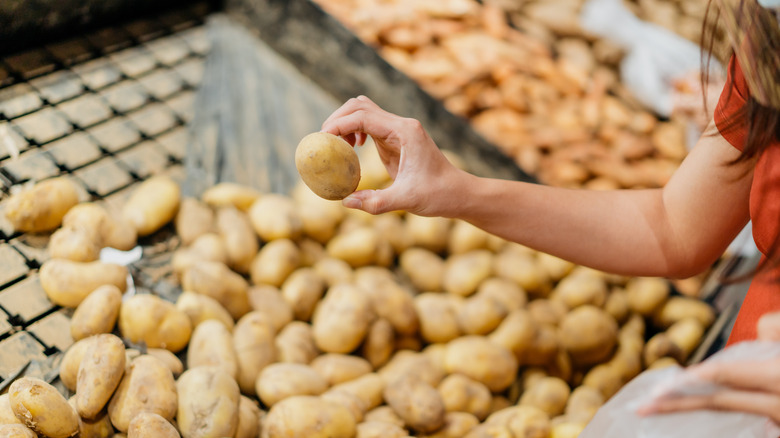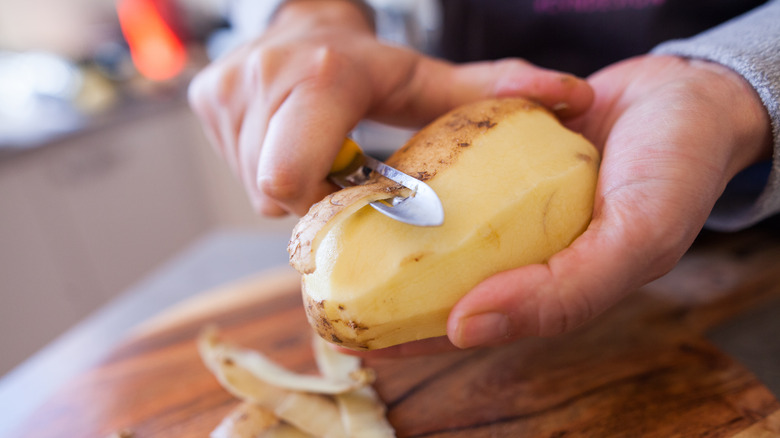Eating Potatoes Every Day Has An Unexpected Effect On Your Blood Pressure
Potatoes generally get a bad rap. They're a rich source of carbohydrates and they come packaged as yummy delights like potato chips or mashed potatoes which we end up eating a lot of. This can easily become a source of weight gain and other health concerns.
In the context of blood pressure, however, the studies pertaining to potatoes have been interesting, to say the least. While one group of researchers has found negative associations between blood pressure and potato intake, others have found the opposite. For example, according to a 2016 observational study, which looked at three large longitudinal cohort studies, published in the British Medical Journal, higher long-term consumption of baked, boiled, or mashed potatoes was associated with a bigger risk of high blood pressure in women. The study also unveiled a somewhat unexpected effect — while increased intake of French fries was associated with a risk of hypertension in all three cohorts, the same was not found with increased consumption of potato chips. (This may have to do with the chips being smaller, portion size-wise.)
According to a 2024 study published in Human Nutrition and Metabolism, there was a positive trend in blood pressure and waist circumference in individuals with and without type 2 diabetes who consumed a DASH or Dietary Approaches to Stop Hypertension diet and non-fried and fried potatoes for six weeks. Before we get into whether potatoes are a food you should eat or avoid for high blood pressure, let's see what the science says about its positive effects.
The potassium in potatoes can reduce your blood pressure
Experts and scientific studies have noted the value of potassium when it comes to combatting high blood pressure. Potatoes contain a lot of potassium. They are also a source of vitamin C, fiber (courtesy the skin), calcium, magnesium, vitamin B6, niacin, and folate. In the context of high blood pressure, "potassium works in a couple of different ways: It helps your body flush out excess sodium and relaxes the walls of your blood vessels, which allows more blood flow," explained registered dietitian, Sarah Pflugradt (via Eating Well). Excess sodium causes an increase in fluid volume in your blood vessels because your body retains water with excessive salt intake. This contributes to high blood pressure.
Increasing calcium, magnesium, and vitamin C in your diet is also linked with lower blood pressure, per a 2013 study published in the Annals of Medicine. The other nutrients in potatoes (niacin, folate, and vitamin B6) are also associated with lowering blood pressure, per the study. Now, on to the most important question of the day.
Potatoes: Yay or nay for blood pressure?
The 2016 British Medical Journal study noted that some of the reasons for their high blood pressure findings were likely due to potato's high glycemic load. Even though they're technically considered a complex carb, potatoes contain a lot of starch, which can cause spikes in your blood sugar because they're absorbed more readily by your body. A rise in blood sugar is linked to heart disease and high blood pressure too. Blood vessel lining dysfunction, oxidative stress, and inflammation were all thought to be unexpected effects of post-meal hyperglycemia (high blood glucose levels), which in turn could be contributing to hypertension, per the research.
Additionally, weight gain, linked with eating too many potatoes, could also be leading to high blood pressure, noted the study. The research, however, shared its limitations too. The information pertaining to potato consumption and blood pressure readings were self-reported and it is also unclear if how the potatoes are consumed (with salt and added fat like butter, etc.) could have had anything to do with the findings. This brings us back to what experts advise regarding potato consumption.
When eaten the right way, as part of a balanced diet, and in moderation, potatoes can help with high blood pressure and heart health. Instead of baking or mashing the potatoes slathered in butter, deep-frying them in oil, or coating them with salt, opt for healthier alternatives like baking, broiling, or steaming them (skin on) and flavoring with healthy herbs and spices, shared research assistant professor at the New York University Grossman School of Medicine, Emily Johnston (via The American Heart Association). One medium-sized potato a day is what experts recommend.



